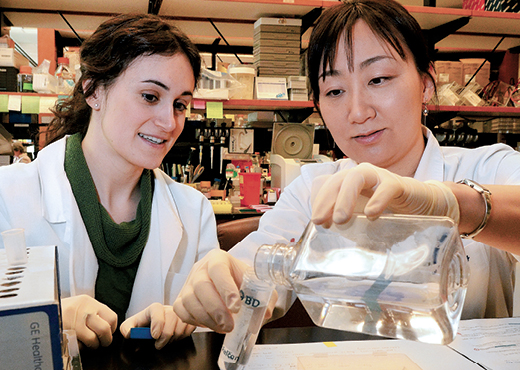Cancer researchers dream of a day when conquering cancer is more about prevention and less about trying to outwit cancer cells through treatment that often is difficult. While believing that day will come, researchers also know it could take some time. Many cancers are not the same diseases they were even a few years ago, and new subtypes of cancer continue to develop and confound the search for cures.
To win the fight, Winship leaders have strengthened the offense. In 2011, Winship and the Graduate Division of Biological and Biomedical Sciences (GDBBS) of Emory's Laney Graduate School started a cancer biology graduate program, in which the next generation of cancer investigators is immersed in cancer biology at a much earlier stage in their education than in years past. It's another example of the leadership that sets Winship apart, and it shows the heightened emphasis on research that occurs at National Cancer Institute (NCI)-designated cancer centers.
"Our program offers multidisciplinary training dedicated to cancer research in the setting of a comprehensive university that has an NCI-designated cancer center. Very few institutions can offer all three," says the cancer biology graduate program's director, Erwin Van Meir.
Cancer research starts with solving the mysteries locked inside a cell: what exactly happens as healthy cells transform from normal to malignant? Why are some cancer cells drug-resistant, while others respond positively to a new treatment? Why and when do cancer cells metastasize, and what processes move cancers into remission?
"I am absolutely passionate about this program — it has superb leadership that understands the crucial value of connections among the basic sciences and patients, healthcare givers, and social conditions. The program's curriculum and professional experiences are designed with all this in mind" Lisa A. Tedesco | |
These are some of the questions that students tackle in the program. What's more, some scholars are motivated to answer those questions for both scientific and personal reasons.
"In the past year, I have known five people who have been diagnosed with cancer, and only three are still with us," says second-year graduate student Gina Alesi. "This personal connection to cancer strengthens my resolve to find a cure and is an affirmation of my decision to go into cancer research.
Before pursuing her PhD in the cancer biology graduate program, Alesi received her undergraduate and master's degrees in biomedical engineering from the University of Michigan. Last year, she joined the laboratory of Sumin Kang, assistant professor of hematology and medical oncology, to investigate the mechanisms behind cancer metastasis.
"Metastatic tumors are more aggressive than primary tumors, and they account for more than 90% of all cancer deaths. My goal is to determine novel targets and underlying mechanisms in cancer metastasis in order to develop targeted molecular therapies," says Alesi. "Eventually, I hope to become a professor and lead a research team to make new discoveries about cancer in my own lab."
That degree of focus and dedication is common to all 16 of the students who are currently in the cancer biology graduate program, now in its second year and in the process of recruiting the third class of PhD candidates to begin matriculation in the fall.
The program includes training in every aspect of cancer research—molecular and cellular biology, genetics, signal transduction (how cells respond to an external stimulus), genetic engineering, nanotechnology, and other disciplines used to understand the development and progression of cancer. The graduate program's close alliance with Winship is a big draw to students.

